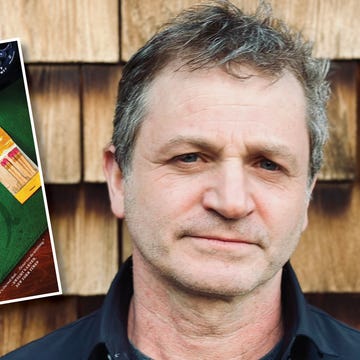Steve Sando has made heirloom beans cool. The founder of the Napa-based Rancho Gordo food company, Sando has developed a cult-like following of his coveted legumes. In fact, Rancho Gordo’s Bean Club boasts around 26,000 members—an impressive following for any club, much less one devoted to, well, beans. Profiled by Gustavo Arellano in Alta Journal’s Issue 31, Sando is just as interesting a subject as his company. Join Alta Live as we welcome Sando in conversation with Arellano as the two talk about the complexities of starting and succeeding in the bean business, what makes Rancho Gordo products so special, and why Sando’s most popular product, the Corona, takes hours to prepare. Come with questions and an appetite!
About the guest:
Since 2001, Steve Sando has taken the lowly bean from a healthy but neglected, over-bred member of the vegetable family to a near superstar-status ingredient. Sando’s company, Rancho Gordo, grows heirloom and heritage varieties and works with influential chefs like Thomas Keller, Deborah Madison, Paula Wolfert, and Annie Sommerville. Sando’s seed-saving efforts and bean production provide professional and home chefs with the opportunity to literally eat American history. Sando’s heirloom beans, along with corn and chiles, have become vital ingredients in the new American food revolution centered in the San Francisco Bay Area. In fact, Sando and Rancho Gordo were named Number Two on Saveur magazine’s prestigious The Saveur 100 list for 2008. Rancho Gordo production is primarily in California. In addition to beans, it is promoting, growing, and occasionally importing Indigenous foods of the Americas. Sando constantly tours the Americas looking for rare, endangered, and delicious samples to save and grow in his trial gardens in Napa, California.
Sando’s books include Heirloom Beans: Recipes from Rancho Gordo, cowritten with Vanessa Barrington and with an introduction by Thomas Keller, (Chronicle Books, 2008), The Rancho Gordo Heirloom Bean Grower’s Guide (Timber Press, 2011), Supper at Rancho Gordo (Rancho Gordo Press, 2014), and The Rancho Gordo Vegetarian Kitchen (Rancho Gordo New World Speciality Foods, 2017) with Julia Newberry. Sando was named as one of Bon Appétit magazine’s Hot Ten, along with Daniel Boulud and Ubuntu’s Jeremy Fox.
About the moderator:
Gustavo Arellano is the author of Orange County: A Personal History and Taco USA: How Mexican Food Conquered America. In 2025, Arellano was named a Pulitzer Prize finalist for his work as a columnist for the Los Angeles Times. He was formerly editor of OC Weekly, an alternative newspaper in Orange County, California, and penned the award-winning ¡Ask a Mexican!, a nationally syndicated column in which he answered any and all questions about America’s spiciest and largest minority. Arellano is the recipient of awards ranging from the Association of Alternative Newsweeklies Best Columnist to the Los Angeles Press Club President’s Award to an Impact Award from the National Hispanic Media Coalition, and he was recognized by the California Latino Legislative Caucus with a 2008 Spirit Award for his “exceptional vision, creativity, and work ethic.” Arellano is a lifelong resident of Orange County and is the proud son of two Mexican immigrants, one of whom came to this country in the trunk of a Chevy.
Here are some notable quotes from today’s event:
- On beans and their moments: “They’ve had their moment many times—and moments pass. I always hate it. I mean, a mutual friend, Evan Kleiman, said, ‘Oh, beans are having their moment,’ at the height of COVID, and I just cringed, thinking, Well, no, it’s going to go. I would be more excited if I changed the way people eat and beans are really incorporated into our food—and not just this week’s flavor. That would make me the happiest.”
- On the obscurity of beans: “They’re indigenous to the Americas, and just being here in Napa, every obscure vinegar from some valley in France is known, and yet we don’t even know our own food. I remember growing the Rio Zape, thinking these were absolutely delicious. My goal is that every home cook would say, ‘Oh, we’ll do Rio Zape tonight,’ and know what that means.”
- On cooking beans: “There’s this intimidation with beans. Like, it takes hours, and you have to soak, and they give you gas, and it’s a burden. But it actually isn’t. It’s stupid-easy work, discovering that. And I think every bean person goes through that, where it’s like, ‘Oh, this is not that big a deal, and I can do this.’ I think there’s a level of confidence you get as a home cook, and beans do that.”
- On the popularity of beans: “It’s not sort of a bitter-old-hippie-food. It’s not a lonely-old-person-who-lived-through-the-depression food. And it’s really not just Mexicans. Everybody can do this. And I think I might have offered a way to do it.”
Check out these links to some of the topics brought up this week.
- Read Arellano’s “At Home with the Bean King.”
- Join the Rancho Gordo Bean Club.
- Buy a copy ofSando’s The Bean Book.
- Check out the Rancho Gordo inventory.
- Find Rancho Gordo beans at these retailers.
- Give the gift of beans.
- Visit the Alta Baja Market and stay tuned for Heirloom Bean Encuentro updates.
- Explore Sando’s music.
- Watch Marcella, featuring Sando.•











